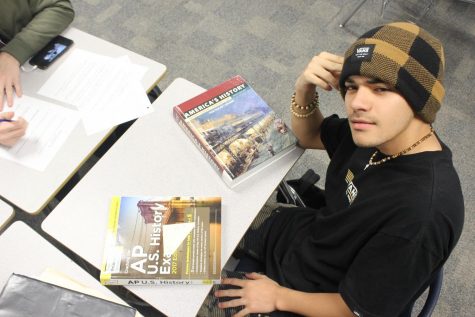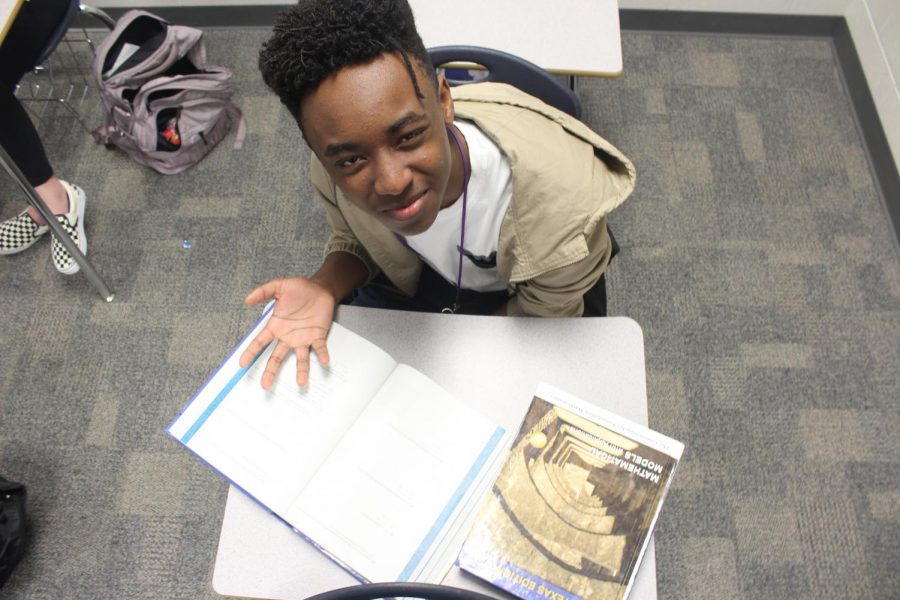No College After High School
A student is confused about which subject to choose in school.
It is commonly expected that high school graduates attend college or university the fall after their graduation, however, that does not always have to be the case. Often times as students graduate high school they are relieved after enduring so many years of education that they are ready for a break.
After high school, people can choose to take a rest for a year, work or gain experience, enter the military, or do something that makes them happy as they take a rest from their schooling. Senior Lamonica White says that after high school, she is taking a year off from school so that she can recollect her thoughts about her future.
“I am going to take a gap year. Work for a year, then figure out more about which college I want to go to. I still don’t know where I am going yet. I learned from Mr. Olsen that it doesn’t matter if you don’t know yet right away. I don’t want to spend a lot of money on college and something I don’t want to do,” said White.
Time is an essential and much-needed factor for people when they are making a decision because it is limited, which can be seen in college application deadlines, and that may affect their future. By the time her gap year is over, White says she plans on on having a career in the medical field, similar to her mother.
“Some people need more time than others, and I need more time. When I go to college, I may be interested in nursing. My mom is a nurse, so I feel like she could teach me a lot. I would like to be in college studying to be an RN, and if not an RN, then a veterinarian” said White.
Reasonably, White has her doubts. She says she is worried that she may never even go to college because there can be a possibility that she will lose motivation. However, in order to avoid that, she intends to be attentive to her school work while in college.
“I’m scared if I lose faith in going to college eventually and that I’ll never go if I wait too long. Some people would be like, ‘Oh my goodness, that’s stupid.’ But at the same time, it didn’t change my plan. When I do go to college, I plan on staying focused,” said White.
Lake Ridge has a center with college students from UT Arlington who educate and advise students about college and after high school plans. Brooke Williams, UTA Go Center mentor, says that students should not lose motivation to attend school after taking their break.
“My advice would be to make sure that they are not discouraging themselves within that year or starting to talk themselves out of going to college. I think that’s one of the most dangerous things about a gap year. They should make sure that they’re still planning ahead and preparing for their first year,” said Williams.
Williams explains that a primary reason students decide to take a gap year is to work in order to pay for their college expenses, or they simply want a break from all those years of schooling they have received.
“For the most part, people choose to work because they need to raise more money to pay for their own way to college, usually it’s people who have to pay out of their own pocket. Some people want a mental break,” said Williams.
While high school does not necessarily prepare students for a gap year, it does give options other than college or a gap year, such as JROTC, that help students who want to join a service of the military get a feel of what it is like. Senior Dylan Craddock is not exactly taking a gap year, but is joining the military after he graduates high school.

A student is confused about which subject is best for him for school.
“After high school, I plan on joining the Marine Corps. I’ve wanted to do it for a long time and it seems like it has a purpose. My grandparents were in the military, the Army. I’m not really a huge fan of school, so I didn’t really want to go to college,” said Craddock.
Contrary to White, Craddock does not have fears about his plan, but the people who are close to him are concerned.
“I don’t have any worries, but my parents do. My mom was pretty scared. Everyone that I knew already knew that I wanted to be in the military, so it wasn’t a huge surprise to them,” said Craddock.
Additionally, Craddock says he will have the advantage of retiring early once he finishes his Marine Corps service. While he serves he plans to strive to achieve his goals.
“I’ll be able to retire at 38-years-old and get the benefits of being in the military. After I retire, I plan on moving to New York and being a fire fighter. I plan on doing everything I’m asked and stay ambitious and motivated,” said Craddock.
Colleges do not really offer a specific major for someone who only wants to be a hair stylist or mechanic, but vocational and trade schools do. Counselor Lisa Davis says that trade and vocational schools are similar and people usually attend them to acquire a skill they can use as a professional career
“A vocational or trade school is a post-secondary school that you go to, and instead of taking a series of classes, like a lot of schools, you get your basics. Like your core classes in high school, similar to that. Then you move on to more specific classes. At a trade school, you go straight into there to learn a skill. Some of them are cheaper, but some are just as or more expensive than college,” Davis said.
Davis says students sometimes decide to take this path if they know what the future already holds for them.
“Some students have a family business, so they want to go straight into it because they know they have a guaranteed job. Some students just know that they are going to do hands-on skilled labor. I had a student one year get his scuba diving license and he went straight to welding school so he could be an underwater welder,” Davis explained.
Davis suggests watching over a professional in the career you want in order to see if your truly want it as a career. She also says trade schools use more of a tactical learning style.
“Students should go and shadow someone in that career and ask them questions to make sure that’s really what they want to do. Typically, vocational schools are a lot more hands-on from the very beginning, not when you get to the upper-level classes. When you go to a specific trade school, you’re kind of limiting yourself to your options right away,” Davis said.
Trade do schools do usually give students opportunities they can take in order to attend that school. Davis says it is best to start thinking about a future education somewhat as early as freshman year.
“We will have trade schools come visit. Sometimes, a lot of trade schools will give us the option to give students scholarships. They just tell us about them and then we tell the students who we know want to go there. For those kids, typically, they don’t have to take an SAT or ACT. It’s more so the process,” said Davis. When a kid is in high school, we will talk to them starting from their freshman year, ‘Explore the classes at Ben Barber. Try to get a better idea of what you really want to do.’ By the time it comes to make that decisions, whether or not to go to college or trade school, then they have a better idea.”
As a Go Center mentor who constantly counsels students, Williams says it is important to avoid strongly forcing an opposing opinion on someone who is not attending college. Instead, William advises that you gently speak with them, understand their choices, and give them extra options, all while being judge-free and guiding them to a good path.
“I try not to push. I think everyone is going to be entitled to their own decision. If you push them to do something they are not going to want to do, they are not going to want to talk to you anymore. So really, I just lay out their options and what it’s going to look like. The benefits of going to college versus not, ask them what their plan is and why they are choosing not to, and kind of evaluate which one would be better for them, because I know that everyone has different circumstances,” said Williams.
While not wanting to be too authoritative on one’s college attendance decisions, Williams will often try to persuade students who say they will not go to college due to its pricing because she believes that there are many ways expenses can be taken care of, for the most part.
“If they’re deciding to join the armed forces, that might be a valid reason or they already have a good job lined up, maybe like a family business. All those things I think would be okay. The number one thing I don’t think is okay, though, is if they think they shouldn’t go just because they can’t afford it. There are a lot of ways around that, and that’s when I try and steer them the other way,” said Williams.
Williams says that the main goal of the Go Center is not just college, but is also the well-being of student’s future, whether they decide to attend college or not because they can still benefit from it.
“That’s kind of why we don’t push exactly for college because that is not all we’re about. We can help with anything that’s post high school, so vocational-technical schools for a technical degree, armed forces, or even community colleges if they are not wanting to go to a university. Even straight into the work force. We can help them get in contact with the people they need to if they have what they need to be able to get that job. We’ll help with a lot more than just college,” said Williams.
The Go Center is not just helpful for future college students, but also for those who will not go to college. Similar to Williams, Maryam Imam, another student mentor for the Go Center, says that the Go Center benefits students who want to have a good future since the Go Center can guide people to other accessible options.
“We do more that just college prep. We ask them what they want to do instead, and whatever they want to d0, we connect them to resources that pertain to that field. We can connect you to recruiters and explore other options for trade schools,and different job opportunities,” said Imam.
Imam says that being productive during a gap year is key so that you can show colleges that you have still been doing an effective amount of work.
“Students can plan on taking their SATs and building up their resume so that when they do apply, they can show the school that they’ve don’t a lot of work during their gap year. People usually work to save up money for college,” said Imam.
Additionally, Imam recommends that students can start to familiarize themselves with the schooling environment a little earlier before they attend so that they can adjust quickly to it, especially after being away from it for so long.
“I would make a schedule for studying because you’re probably not used to studying in an academic environment and I would get involved on campus so that it can get you back into the swing of school and the process,” said Imam.
Whether or not they decide to take the commonly expected college route or not, in the end, most students try to choose a path they believe will benefit them in the long run.



